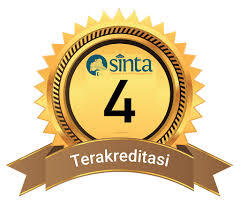Ideologi Pendidikan Islam Pesantren di Indonesia Perspektif Muhammad Jawwad Ridla dan William O’neal
 Abstract views: 1364
,
Abstract views: 1364
,
 PDF downloads: 1291
PDF downloads: 1291
 Untitled downloads: 0
Untitled downloads: 0
Abstract
Ideologi merupakan sesuatu yang hidup dalam masyarakat sosial Indonesia. Di dalam masyarakat terdapat pendidikan Islam sebagai salah satu sarana penyebaran dan pemantapan ideologi yang sesuai dengan negara mempunyai peran strategis dalam kehidupan masyarakat. Tujuan penelitian ini untuk memahami pondok pesantren yang ada merupakan entitas pendidikan tertua di Indonesia, menarik untuk dilihat: Bagaimanakah pendidikan Islam di pondok pesantren yang ada di Indonesia dalam perspektif ideologi pendidikan Muhammad Jawwad Ridla dan William F. O’neal? Metode penelitian kualitatif dengan library research, mengambil data dari buku, artikel dan hasil penelitian. Adapun pendidikan Islam di pondok pesantren yang ada di Indonesia mempunyai kesamaan dengan perspektif agamis-konservatif (al-Muhafidz) sedangkan dalam perspektif William F. O’neal pendidikan pondok pesantren ideologi konservatisme pendidikan.
Downloads
Copyright (c) 2019 TADRIS: Jurnal Pendidikan Islam

This work is licensed under a Creative Commons Attribution-NonCommercial 4.0 International License.
The journal operates an Open Access policy under a Creative Commons Non-Commercial 4.0 International license. Authors who publish with this journal agree to the following terms:
- Authors retain copyright and grant the journal right of first publication with the work simultaneously licensed under a
 Commons Attribution-NonCommercial 4.0 International License
Commons Attribution-NonCommercial 4.0 International Licensethat allows others to share — copy and redistribute the material in any medium or format, and adapt — remix, transform, and build upon the material.
- Authors are able to enter into separate, additional contractual arrangements for the non-exclusive distribution of the journal's published version of the work (e.g., post it to an institutional repository or publish it in a book), with an acknowledgement of its initial publication in this journal.
- Authors are permitted and encouraged to post their work online (e.g., in institutional repositories or on their website) prior to and during the submission process, as it can lead to productive exchanges, as well as earlier and greater citation of published work (see The Effect of Open Access).














